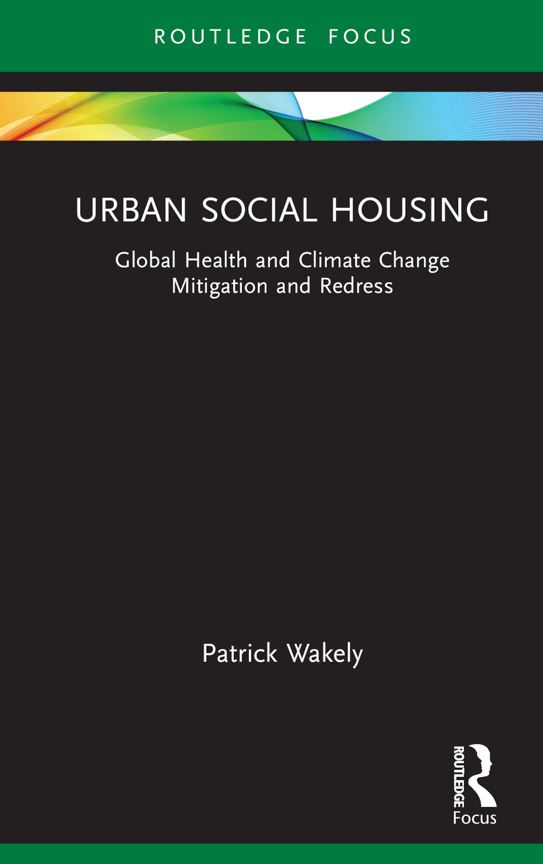
New book (2024) 'Urban Social Housing' (Patrick Wakely)
Submitted by frankie on Fri, 2024-02-16 10:44.
Wakely 2022

First published (hardback), February 2024: UK£48.99
Return to top
CONTENTS
ENDORSEMENTS
Return to top
The views expressed in 'Recent News & Reflections' are those of the author and do not necessarily reflect those of any of the governments, organisations or agencies with whom they have been working.

|
‘Urban Social Housing’ proposes operational approaches to public sector support to community-led development of urban low-income group social housing in the prevailing and medium-term. Within the context of mitigating and redressing the existential threats of climate change and global pathogenic transmission, building on current concerns of global heating and the lessons learnt from the 2020-22 COVID-19 pandemic, the book closely examines recent examples from a wide international range of countries and cities with in-depth case studies drawn from Northern Europe, the Middle East and Latin America. Topics include maintenance and management of public sector housing, poverty alleviation objectives, climate change mitigation, housing density, local land management and planning, land rights, affordable housing markets, and international governance and administration, ultimately pointing to the universal need for institutional, organisational and human skills development and the compilation and dissemination of operationally successful examples of participatory partnerships for affordable social and public housing. The book will be of interest to researchers, instructors, practitioners, and students of urban development, housing, environmental design, land-use planning, public administration and environmental health engineering. .
Patrick Wakely is an independent policy adviser, DPU Associates Co-ordinator, and Professor Emeritus of Urban Development in the University of London and former Director of the Development Planning Unit (DPU), University College London (UCL). An architect (AA Dipl, London), he has 40 years of experience of research, consultancy and teaching in housing, planning and urban development, on which he has worked in more than 20 countries.
Paperback, 2025: £18.99; US$24.95
eBook: £18.99; US$24.95
subscriptions@tandf.co.ukReturn to top
Foreword by Robert Biel
Preface & Introduction
Urban social housing vs public housing
1. Prevailing and emerging policy approaches
State intervention in low-income group housing; ‘Conventional’ public works tradition; ‘Non-conventional’ controlled participation.
2. Implementation strategies
Local government-community-NGO Partnerships; Components of authority;
Subsidiarity.
3. Land and location
Location; Geophysical determinants; Peri-urban development; Coastal locations
4. Land use and landscape planning & management
Local land management and planning; Participation and partnerships in land use planning and maintenance
5. Legislation, norms and standards
Land rights, title and tenure; Urban land and housing markets.
6. Financial support and the way ahead
Financing urban housing adaptation; Local management and technical supports.
Postscript
‘New Normal’ urban social housing policies and implementation strategies; Preparedness and data management.
Bibliography
Return to top
Responses to the need for low-income urban housing have evolved over the past 80 years. It is still evolving, influenced even more so now by the climate crisis and the need to consider public health. In this book, Professor Wakely captures the essence of these and other key determinants in influencing that evolution, including land tenure, land use management, financing, and the need for ongoing partnership and collaboration. This book is a valuable resource for those engaged in low-income urban housing and must contribute to shaping future strategies and responses for all role players in this field. The recent COVID-19 pandemic and the fast-growing global heating process have both highlighted the centrality of housing and health conditions in urban areas. It is urgently necessary to understand the limits and possibilities of policies and strategies that aim to provide access to housing, especially for the more vulnerable groups. Lessons already exist, such as those so well organised by Professor Wakely in this important and timely book, written with precision as a result of decades of reflection, research, teaching and action in many countries. It articulates information, analysis, and original proposals for the formulation of answers to the global urban housing crisis.
Greg Munro, Director, Cities Alliance, Brussels, Belgium
In this book Patrick Wakely offers a historical account of the evolution of housing policies from the mid-Twentieth century, making the critical distinction between ‘public’ and ‘social’ housing. He examines the travelling of policy and legal framing across the so-called Global North and South and the emergence and recognition of collective processes of the social production of habitat, while arguing that the right to adequate housing cannot be advanced in dissociation from other contemporary crises, notably the climate emergency and the global health crisis, manifested through the COVID-19 pandemic, 2021-23.
Adriana Allen, Professor, University College London (UCL), UK and formerly President of Habitat International Coalition (HIC).
Edesio Fernandes, urban and environmental researcher, teacher and advisor to the United Nations, World Bank and other international agencies, formerly Director of Land Affairs at the Ministry of Cities, Federal Government of Brazil.
Ramin Keivani, Professor of International Land Policy and Urban Development, Oxford Brookes University.
Return to top
